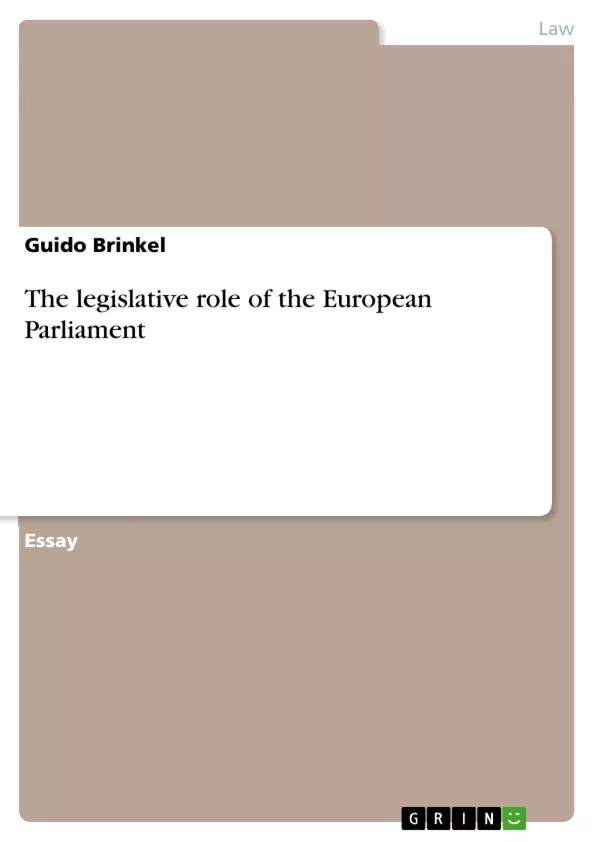1. Introduction
When in 1952 the European Coal and Steal Community "Assembly" met for the first time it was a "relatively powerless" institution of 78 delegated representatives. When the "European Parliament" meets today, almost 50 years later, it is not only the name that has changed in the meantime, but also the size, the powers and, above all, the whole idea behind it. Especially by establishing direct elections in 1978 and establishing the co-decision procedure in 1996 the Parliament's role has changed towards a more and more influential institution. However, these were hard-won gains, reflecting the longstanding scepticism or even distaste of governments in most EEC member states for any increase of the powers of the European Parliament. Moreover, the Parliament had to struggle for years with a bad public perception (if it was perceived at all), for example that it was not more than a waste of taxpayer's money. And particularly due to this bad perception, the elections for the EP still suffer from a remarkable low participation. Nevertheless, the Parliament has become an important institution within the EU, that has to be taken seriously. In March 1999, for example, by threatening to sack the Commission and demanding an independent report on alleged fraud and lack of accountability within it, it became the moving power behind the resignation of the entire European Commission. Moreover, the EP has become a forum for speeches of many world leaders and the committees of the Parliament have produced highly influential reports. However, the new role of the EP within the EU and Europe at all is best shown in another, much more significant area, namely it's legislative competence.
[...]
Inhaltsverzeichnis (Table of Contents)
- Introduction
- The evolution of the legislative role of the EP
- The evolution before 1986
- The Single European Act
- The Maastricht and Amsterdam Treaties - the co-decision procedure
- The EP's role today
- co-decision - a brief evaluation
- the legislative process as a whole - evaluation
- The complex shaping of the process
- legislative initiatives
- quo vadis, EP? - the EP's role in the future
- The Treaty of Nice and its changes regarding the European Parliament
- The Parliaments resolution of 13 April 2000
- The Treaty of Nice itself
- General expectation about the future role of the EP
- The Treaty of Nice and its changes regarding the European Parliament
Zielsetzung und Themenschwerpunkte (Objectives and Key Themes)
This essay examines the evolution of the European Parliament's legislative role, highlighting its growing influence within the European Union (EU). The focus is on understanding the key developments that have shaped the Parliament's power and the ongoing debate about its future role.
- The evolution of the European Parliament's legislative powers from its inception to the present
- The impact of key treaties, including the Single European Act, the Maastricht Treaty, and the Treaty of Amsterdam, on the Parliament's role
- The co-decision procedure and its implications for the legislative process
- The challenges and opportunities facing the Parliament in the future
- The ongoing debate regarding the Parliament's role and influence within the EU
Zusammenfassung der Kapitel (Chapter Summaries)
The introduction traces the transformation of the European Parliament from a relatively powerless institution to a more influential body with a growing legislative mandate. The focus is on the significant changes that have occurred, particularly with the introduction of direct elections and the co-decision procedure. The essay highlights the Parliament's struggles to overcome public skepticism and achieve recognition as a key player in the EU decision-making process.
Chapter 2 delves into the evolution of the European Parliament's legislative role. It explores the initial limited powers granted to the institution, primarily advisory and supervisory in nature, and the challenges faced in expanding its influence. The chapter discusses the transition from consultation procedures to a more active role in the legislative process, leading to the eventual adoption of the co-decision procedure.
Chapter 3 analyzes the current state of the European Parliament's legislative power. It examines the co-decision procedure and evaluates its strengths and weaknesses. The chapter also investigates the overall legislative process, exploring its complex nature and the role of legislative initiatives.
Chapter 4 focuses on the future of the European Parliament, examining the potential impact of the Treaty of Nice and its implications for the institution. The chapter discusses the Parliament's resolutions and expectations surrounding its role within the EU in the years to come.
Schlüsselwörter (Keywords)
The main keywords and focus topics of this essay include: European Parliament, legislative role, co-decision procedure, EU lawmaking, Treaty of Nice, direct elections, public perception, legislative power, European Union, institutional development.
Frequently Asked Questions
How has the European Parliament's role changed since 1952?
It transformed from a relatively powerless "Assembly" of 78 delegated representatives into a highly influential institution with significant legislative competence.
What is the "co-decision procedure"?
Established in 1996, it is a legislative process that significantly increased the Parliament's power by allowing it to share decision-making authority with the Council.
Which treaties were most influential in expanding the Parliament's power?
The Single European Act, the Maastricht Treaty, and the Amsterdam Treaty are highlighted as key milestones in the evolution of its legislative role.
What challenges does the European Parliament face regarding public perception?
The Parliament has struggled with being perceived as a waste of taxpayer money, which has contributed to remarkably low participation in EP elections.
What impact did the Treaty of Nice have on the European Parliament?
The essay discusses the changes introduced by the Treaty of Nice and how they aligned with or differed from the Parliament's own resolutions regarding its future role.
Can the European Parliament influence the European Commission?
Yes; for example, in March 1999, the EP's pressure regarding accountability and fraud led to the resignation of the entire European Commission.
- Arbeit zitieren
- Guido Brinkel (Autor:in), 2001, The legislative role of the European Parliament, München, GRIN Verlag, https://www.grin.com/document/925



